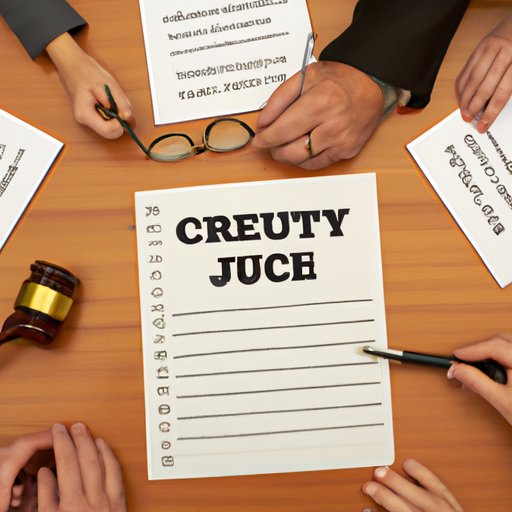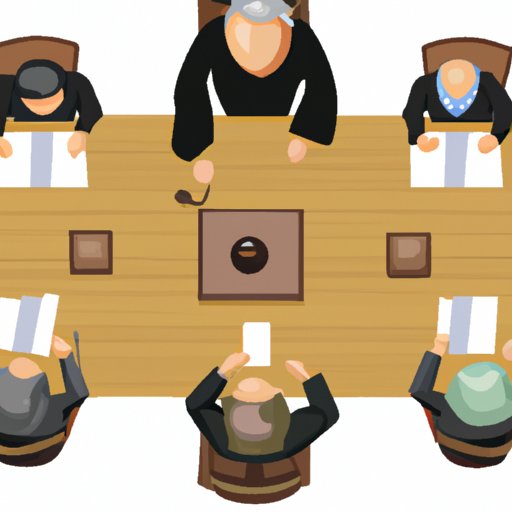Introduction
A jury is a group of people who are chosen to hear evidence and decide upon a verdict during a court case. This group of people are randomly selected by the court from the general public and serve as the jury for a particular case. The primary purpose of the jury is to ensure that justice is served by providing an impartial decision based on the facts presented. The jury has the power to determine whether someone is guilty or not guilty in criminal cases, and can also be used to decide civil disputes between parties.
Explaining the Function of a Jury
The primary function of a jury is to listen to evidence presented in court and come to a decision based on that evidence. In order to do this, there are certain steps that must be taken. First, the court must select a jury from the general public. This selection process is typically done through a random selection process, such as a lottery. Once the jury has been chosen, they will then be asked to take an oath in which they promise to remain impartial and base their decisions solely on the evidence presented in court.
Once the jury has been sworn in, they will then be instructed by the judge on their roles and responsibilities. The judge plays an important role in the jury process by providing guidance and instruction on the law and how it applies to the case. The jury is responsible for listening to the evidence presented by both sides in the case, considering the arguments made by each side, and ultimately coming to a decision based on the evidence.

Examining Types of Cases that Require a Jury
Juries are typically used in two types of cases: civil cases and criminal cases. In civil cases, juries are used to decide disputes between two parties. This could include disputes over contracts, property rights, or other matters. In criminal cases, juries are used to determine whether or not a defendant is guilty or not guilty of a crime. In either type of case, the jury is responsible for listening to the evidence presented and making an impartial decision based on that evidence.
Analyzing the Process of Jury Deliberations
Once the evidence has been presented and the attorneys have finished their closing arguments, the jury will then begin their deliberations. During this process, the jury will discuss the case and try to reach a unanimous verdict. The jury is led by a foreperson, who is usually chosen by a majority vote from the jury. The foreperson is responsible for leading the discussion and ensuring that all jury members are heard. The jury must reach a unanimous verdict, meaning that all members of the jury must agree on the same outcome.
Once the jury has reached a verdict, they will then present it to the judge. The judge will then read the verdict to the court and declare it as the official verdict of the case. If the jury is unable to reach a unanimous verdict, the judge may declare a mistrial and the case will need to be retried with a new jury.

Describing the Responsibilities of a Juror
Serving on a jury is a serious responsibility. As a juror, you are responsible for listening to the evidence presented in court and making an impartial decision based on that evidence. You must understand the case and the law in order to make an informed decision. You must also pay attention to the evidence presented and follow the instructions provided by the judge. Finally, you must remain impartial throughout the process and be willing to change your opinion if necessary.

Investigating the Pros and Cons of Jury Trials
Jury trials can be beneficial in some situations, but also have drawbacks. On the plus side, jury trials allow for a more democratic approach to justice, since the jury is made up of ordinary citizens rather than legal professionals. Additionally, jury trials provide an opportunity for both sides to present their case and be heard. On the downside, jury trials can be expensive and time consuming. Additionally, jury decisions can sometimes be unpredictable, as jurors may be swayed by emotion or personal biases.
Conclusion
In conclusion, a jury is a group of people who are randomly selected to listen to evidence and make a decision in a court case. They have the power to determine the outcome of both civil and criminal cases. The process of selecting a jury and conducting a trial involves several steps, including selecting a jury, hearing evidence, and deliberating to reach a verdict. Serving on a jury is a serious responsibility, and requires jurors to understand the case and the law, pay attention to the evidence, and remain impartial. Jury trials can be beneficial, but also have drawbacks, including cost and unpredictability.
(Note: Is this article not meeting your expectations? Do you have knowledge or insights to share? Unlock new opportunities and expand your reach by joining our authors team. Click Registration to join us and share your expertise with our readers.)
